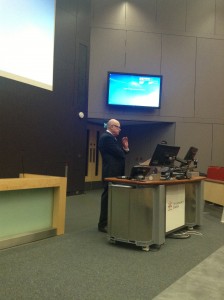
The initiative of reforming the European Union through establishing an economic and monetary union (EMU) underpinned by a political union and a new treaty formally presented by the president of the European Commission in his State of the Union address in September 2012 is gaining momentum. The role of the United Kingdom in this endeavour is unclear, with domestic debate being filled by arguments of all sorts, at times rather confusing. In such situation, a well reasoned, informed and balanced opinion of well known expert in the European Law is more than welcomed. The public lecture of Prof. Alan Dashwood delivered at City University was a master class in this respect – the policy options for the UK government were clearly defined and their relative advantages and limitations assessed based on the analysis of the effective EU legislation.
In the introductory part of his lecture Prof. Dashwood outlined three possible choices for the UK and existing legal grounds for each. The first choice represents a decision to fully embrace the initiative, which means adopting single currency and joining the European Stability Mechanism (ESM), among others. This option is out of discussion as, in Prof. Dashwood’s words, there is no such a UK government which could sign an agreement to ‘join euro-zone in any foreseeable future.’
The second choice is to make best of being a genuine member of the Union, while not participating in euro-zone. The argument behind this course of action is that the central organising principle of the EU constitutional order always has been differentiation, meaning that not all member states are subject to the same rules or accept the same commitments. Therefore it is fair for the UK to negotiate its own place in the reformed Union. In Prof. Dashwood’s opinion, in the face of problems the EU is liable to face and particularly in interaction between EMU and internal market there are some possible solutions for the UK to consider. The third option represents a possibility of satisfactory accommodation with EMU and exit the Union with an attempt to negotiate a disassociation agreement. This would mean adopting a model similar to those of European Economic Area (EEA) countries or Switzerland.
The analysis of these policy choices was presented through four steps.
The first aimed at setting a context for the policy issue at hand—that is an overview of specific legal and institutional arrangements as reflected in the Treaty of Lisbon that apply to countries whose currency is euro. Prof. Dashwood elaborated in detail on various articles of the Treaty serving as the legal ground for economic and fiscal governance in the EU and in the euro area. Particular attention was paid to new arrangements, such as ‘six-pack’ (entered in force on 13 December 2011) and the Treaty on Stability, Coordination and Governance (TSCG). Importance of six-pack was explained as of EU secondary law with an aim to improve fiscal and economic surveillance for all 27 member states, with some specific rules for euro-zone countries, especially regarding financial sanctions. The purpose and key features of TSCG, an intergovernmental agreement signed by all member states except UK and Czech Republic, were explained with particular focus on Fiscal Compact, the TSCG’s fiscal part which introduces budget rules that shall be implemented in national law through provisions of ‘binding force and permanent character, preferably constitutional.’ Prof. Dashwood also explained the ESM’s bailout mechanism and its strict conditionality.
In the second part, Prof. Dashwood discussed the roadmap to EMU and how this could be implemented from the legal point of view. He outlined three stages of this process: 2012-2013, 2013-2014, and post 2014. The reason is that the European Commission (EC) distinguishes between issues of urgency and other issues. This will be more in detail presented by the EU President in June 2013. The measures are envisaged under two categories. First are the measures necessary to implement for stricter and stronger economic governance (which include the six-pack, the TSCG, and two-pack). Second group comprises various measures of banking sector including such measure as SSM, a mechanism for credit institutions within the euro-zone. This would effectively mean the ability of the governing European Central Bank (ECB) and national entities to intervene (on the basis of article 27 para. 6). As for the second stage of 2013-2014, thus far certain amendments have been introduced (13 December 2012) to rules on the decision making of the Board of Supervisors of ECB. Those are initial measures, while the rest is a work in progress—the EC has invited all parties to submit their proposal in the course of 2013. This includes such measures as the establishment by secondary law of a single resolution mechanism. The third stage would look for a well defined fiscal capacity to assist the euro-zone countries in absorbing adjustment shocks while encouraging them to pursue sound fiscal and economic policies. Prof. Dashwood concluded this part saying that it seems that an intergovernmental conference to amend treaties would be launched in near future. However, he assessed, negotiations were unlikely to begin any time sooner.

In the third part of the lecture Prof. Dashwood discussed the problems of UK belonging to the union while remaining outside the euro-zone, and how this could be addressed. In his opinion, the problems UK may face in this case are of two kinds: more immediate and longer term. More immediate is how to manage the risk of caucusing by the euro-zone countries (like situations, when the euro-zone members voting as a block to protect their group interests would act against national interests of non-members). Longer term problems (which are presumably not going to emerge in at least five years) are: How should we react to any demand of the institutional structures of the Union treaties in order to protect our interests when the decision on tax spending policies will be effectively centralised?
Particular issue of concern in the immediate timeframe is when special fora representing euro-zone negotiate with EU bodies separately the issues affecting the interests of all member states. The implications are multiple. They may influence the EC’s agenda setting function. Similarly, this provides an opportunity for concerted position in preparing the business of the Council. The resulting risk is that those institutions would transfer their loyalty from EU to that group. Still, Prof. Dashwood held that this should not be exaggerated, for there are mechanisms for deliberations between member states, both euro-zone members and others. As one solution to this problem a ‘double majority voting’ was entertained (which stands for a voting by simple majority of participating members and simple majority of non-euro-zone members) particularly for voting in bodies like EBA Board of Supervisors. The effective application of this measure is not clear yet, but Prof. Dashwood advised that this might be kept in mind by the UK government and brought out of pocket in the future negotiations.
The final part of the lecture discussed the options of the UK withdrawing completely. In Prof. Dashwood’s opinion these options seem to be deeply unattractive: ‘If we enter the EU we certainly want to remain in the internal market.’ A large issue of the UK’s discontent with membership is that how the EU legislation can suit its own economy. What happens if we are out? We again have to be in the internal market, but this time without any chance of influencing even in a smallest way. Some may ask, what is the difference with the scenario discussed above, when we remain but are constantly outvoted by the organized euro-zone members? This case is worse, because the difference is that we do not have even a chance to debate, to oppose. Another option broadly discussed today is why not to follow the example of Norway or Switzerland. As explained by Prof. Dashwood, those examples do not apply to UK. First, each of these cases has its costs alongside benefits. And second is that the UK economy is different, differently organised and above all oriented globally.
Prof. Dashwood concluded with saying that the UK’s integration into global economy must be maintained. Only way we will be able to do so, is through maintaining our role as a leading member of EU. In his view, it is better to stay in the EU and have patience and commitment to solve those problems out. Without UK the socio-economic competitiveness of EU will be damaged. This inevitably will affect the British economy and society. There are many considerations and arguments beyond the economic sphere as well—such as common security policy will become vulnerable with the UK’s departure, etc. The way forward, as suggested by Prof. Alan Dashwood, is through genius procedural devices and incremental changes to legislation, which are only possible through participation, deliberations and commitment.
The lecture was followed by a Q & A session, where Prof. Dashwood discussed more in detail various issues related to the subject matter. It was indeed a great pleasure to be part of the event—world class expert and perfect lecturer, Prof. Alan Dashwood managed to create a small island of warm, welcoming and highly instructive atmosphere in this otherwise cold winter evening in London. It was an unforgettable evening. I wish we had more such rewarding evenings.
